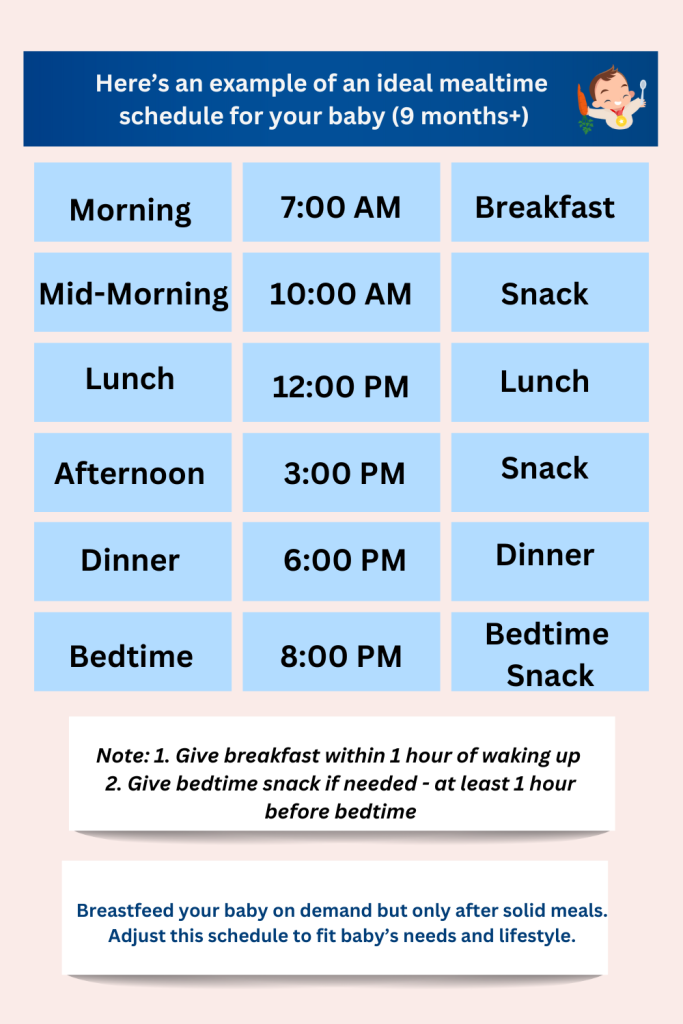As a parent, mealtimes with your child are expected to be one of the most delightful and memorable moments. You imagine peaceful moments, laughing at little untidy faces, and watching your child explore new flavors and textures. However, for many parents, fantasy and reality don’t always align. You experience baby mealtime struggles, mealtime tantrums, food refusal, and an overpowering sensation of dissatisfaction.
Baby mealtime struggles can be one of the most challenging experiences for parents, leading to long, drawn-out meals and exhausting power struggles over food.
In this blog, we’ll look at the typical causes of children’s mealtime tantrums and food refusal. Let’s explore some helpful, sympathetic ways to turn these conflicts into opportunities for bonding and development.
In the end, it’s not just about getting food into little tummies; it’s about developing a pleasant, healthy, and adventurous connection with food that lasts a lifetime.
Understanding the Roots of Mealtime Meltdowns
First, let us understand the root cause of baby mealtime struggles and frustration before we jump into the solutions. Some common causes include:
- Developmental milestones: Babies’ eating habits are influenced by changes in their motor skills, sensory development, and cognitive capacities as they grow up.
- Medical issues: A baby’s appetite and eating habits may be impacted by a number of medical illnesses, including allergies, reflux, or sensory processing abnormalities.
- Environmental factors: Rash mealtimes, uncomfortable eating positions, and distractions can all be the reason for feeding issues.
- Emotional factors: A baby’s feeding patterns may be impacted by stress, anxiety, or emotional turmoil.

Also Read – A guide to best first foods for baby led weaning
Tips to Transform Your Baby Mealtime Struggles into Joyful Moments
- Make a Specific Schedule
Babies love schedules! Making a routine will help you in many ways. Try to provide snacks and meals at around the same time every day. The Happy Eaters App has this amazing feature where professionals build a personalized meal plan depending on your child’s age, nutritional requirements, and preferences. By following these individualized strategies, you can guarantee that your child gets enough nutrition while eating delicious and enticing meals.
Your kid will be able to anticipate meals and control their hunger if you maintain a regular feeding routine. Here’s an example of a timetable that you may use:
- Morning: 7:00 AM – Breakfast
- Mid-morning: 10:00 AM – Snack
- Lunch: 12:00 PM – Lunch
- Afternoon: 3:00 PM – Snack
- Dinner: 6:00 PM – Dinner
- Bedtime: 8:00 PM – Bedtime snack (if needed)
You can adjust this schedule to fit your baby’s needs and lifestyle.

- Respect Your Child’s No
If your baby is showing mealtime frustration or declines a meal, don’t make a fuss. A child needs to learn to recognize their body signals and follow their hunger cues. If your child has a heavy lunch, they may not want to eat much at dinner.
Pressuring children to eat or punishing them if they don’t might create bad connections with food. Forcing children to eat can lead to mealtime tantrums and food refusal, making them despise meals that they would otherwise appreciate.
- Make Mealtime Fun
Express your excitement for healthy eating! Sitting with children and sharing a meal will make them feel more at ease. Spend time engaging in constructive discussions and keeping mealtimes relaxing.
Cut fruits and sandwiches into fun shapes with the help of cookie cutters. Involve your little one in preparing food. Let them help you wash vegetables, mix ingredients, or arrange food on their plates. This will foster a sense of ownership and develop a relationship with food. Make meals visually appealing and interesting by using colored plates and cutlery.
- Be Consistent
If your little one declines a food once, do not give up! It is common for babies to initially reject new foods. Continue to offer new and delightful meals at intervals. It may take ten or more attempts for a toddler’s taste receptors to accept a food. When introducing a new item to your infant, setting limitations on snacks and meals may help them stay hungry.
- Bribing is a Big No
Avoid bribing your baby to eat packaged food, juices, or chocolates. This may make the “reward” appear even more enticing while also making the dish you’re urging them to sample feel like a chore. Instead, focus on making meals enjoyable and stress-free to minimize mealtime tantrums.
- Offer Different Variety
Include all kinds of variety in your little one’s diet! Make their plate full of colors, including green veggies, fruits, high-protein grains, and dairy products. Let them explore different flavors and textures in food.
Try making fun recipes for your baby. The Happy Eaters App has some amazing recipes to offer your baby based on their age and nutrition requirements.
- Create a Healthy Environment
A healthy feeding environment has a big influence on your baby’s eating habits and general development. Show your baby how much you enjoy eating healthy meals! Express enthusiasm for trying new things and demonstrate positive eating habits yourself.
- Make Mealtime a Fun Time
Make mealtime family time! Switch off all your electronic devices and concentrate on your meal. Set an example of eating healthily. Serve the entire family the same dinner. If your child won’t eat the food you’ve prepared, don’t make them something special.
Remember, mealtime tantrums and food refusal are very common, and it’s normal. This simply promotes picky eating habits. Whether or not your child eats it, try to provide them with a balanced meal that contains at least one item they like.
- Water is Equally Important
Make sure that breast milk and formula milk are the most important sources of nourishment for children under one year old. The World Health Organization (2018) advises nursing your kid until they are two years old or older. If your child is still on formula after one year, you can switch to full-fat cow’s milk.
To know more, check out our latest blog: Best Infant Nutrition in the First 12 Months
Regularly provide water to your toddler to keep them hydrated. If your baby enjoys drinking fruit juice, consider providing fruit-infused water instead. This may be a fun experience for you and your child, and whole fruits are less likely to cause tooth rot.
To know more, check out our latest blog: Top 5 Fun and Surefire Ways to Keep Kids Hydrated!
- Ask for Help
If your baby’s mealtime tantrums are bothering you a lot, look for professional help. Take guidance from a pediatrician, registered dietitian, or child psychologist. Always remember, mealtime should be a positive and enjoyable experience.
Stay Positive!
You’ve made ten attempts to provide a healthy bowl of delicious recipes, but it still ends up uneaten. Always remember that this stage will end soon. Even picky eaters can learn to eat well! Kids can grow up and learn to love something they didn’t like before. Since food plays such a significant role in our lives, make dining meals with others fun and stress-free.
What matters the most is offering healthy and freshly prepared home cooked meals to your baby. They will eat when they are hungry. Happy parenting!




